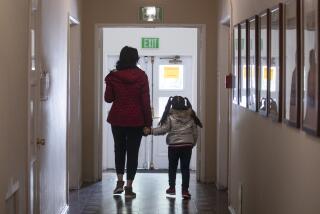Recreation Plan for Women at YWCA Shelter
In an effort to build self-esteem and combat the sense of isolation among homeless women, the downtown YWCA and the San Diego Police Department announced Tuesday that they are beginning a recreational program for them.
The two-year program, to start Nov. 9, will involve women staying overnight at the C Street YWCA emergency shelter, which can house 35 women. The program will offer swimming, aerobics, crafts, cooking classes and lectures on “living skills.”
“The concept is fun for fun’s sake,” said Staff Sgt. Tom Packer of the Police Department’s Central Division, who helped develop the program along with Jeanne Dorsey, shelter director.
Packer said the program’s goal is to “re-establish a sense of accomplishment and success” among the women, who often feel “left out, afraid and forgotten.”
Dorsey said the women at the shelter can stay indefinitely, but they usually are there three to five months before they can find jobs or assistance, then save enough money to move out.
She said no programs for the homeless women were possible before because of a lack of money. Volunteer workers from the Police Department will help overcome the financial restraints faced by the shelter, which Dorsey said “begs and borrows” donations to provide food and a place to stay from 5 p.m. until 7:30 a.m. at a cost of $4.80 per person.
She said the activities program will let the women release their hostility in a positive way and help them to acquire skills needed to interact with others.
“We have to keep the fun, but we can bring in training later,” she said.
Patricia Shields, community coordinator for San Diego County Mental Health Services, said mental health professionals will train volunteers in dealing with psychological problems that may arise. She stressed that it will not be a counseling program, however.
Shields said the main benefit of the twice-weekly activities program is that it “offers a sense of mastery. They can then generalize that behavior.” She added that it is important for the participants to choose the activities they want to pursue.
Jackie Cross, 28, a woman staying at the shelter, said: “We were asked what we wanted. Most of the girls liked swimming.” Aerobics, volleyball and self-defense classes also were popular choices, she said.
Packer said the police role in helping the homeless is not as strange as it may seem, because “we deal with it day in and day out.”
Police officers contact 100 to 150 homeless women every day, he said, adding that perhaps 20% of San Diego’s estimated 5,000 to 6,000 homeless people are women.
Packer said he first met Dorsey in March, when he was assigned to provide security for women who were being harassed as they waited in line to get into the shelter.
He said eight officers have volunteered for the program and that community volunteers will also be sought. Officers will be eligible for college credit from the San Diego Community College District for their service.
More to Read
Sign up for Essential California
The most important California stories and recommendations in your inbox every morning.
You may occasionally receive promotional content from the Los Angeles Times.









